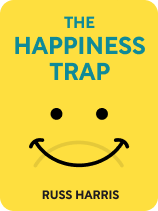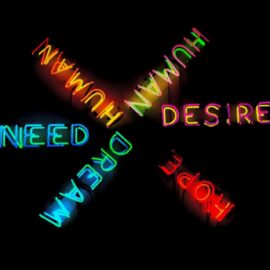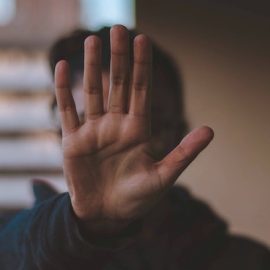

This article is an excerpt from the Shortform book guide to "The Happiness Trap" by Russ Harris. Shortform has the world's best summaries and analyses of books you should be reading.
Like this article? Sign up for a free trial here .
What is the root cause of human unhappiness? Are humans even meant to be happy?
We regard happiness as the most desirable human state. However, as we all know, happiness is fleeting and fragile. Our minds are not wired to be consistently happy. They are wired for survival.
Here is why evolution didn’t mean for us to be happy.
Humans Aren’t Naturally Happy
In his book The Happiness Trap, Russ Harris points out that we regard happiness as the most desirable human condition. The pursuit of happiness is even enshrined as a fundamental human right, alongside life and liberty, in the U.S. Declaration of Independence. Media and the internet bombard us with images of people who are beautiful, intelligent, and wealthy—and presumably happy. We envy them and believe we should strive to be like them. (Shortform note: Many companies also sell happiness by promising their products will make you happy. The late Zappos CEO Tony Hsieh wrote a 2010 book, Delivering Happiness, in which he argued that the way to build a successful business, and to be happy yourself, is to take extraordinary steps to make your employees and customers happy.)
While we expect to be consistently happy, Harris contends that our minds weren’t designed to work that way. He notes that the human brain has evolved with three traits that primitive humans needed to survive:
- The ability to detect threats and avoid them.
- The ability to fit into a group. A primitive human couldn’t afford to be kicked out and left to fend for himself.
- An accumulate-and-improve mentality. A primitive human needed to accumulate enough food to last his clan through lean times.
These traits have persisted on the evolutionary time scale, although they’re not helpful to us today.
(Shortform note: Another often-unhelpful adaptation is our inclination to accept our perceptions as reality, rather than seeking the truth. In some cases, this adaptation persisted because our ancestors simply didn’t need to know the truth—if they wrongly believed that the sun revolved around the earth, it had no impact on their survival. In other cases, acting on perceptions was a form of threat-aversion: For example, believing that people who are different are inherently dangerous helped our ancestors avoid threats from potentially hostile strangers and tribes. However, this fear creates harmful divides in diverse modern societies.)
Harris notes that these three traits have become dysfunctional because:
1. We no longer need threat detection and avoidance to protect us from predators in the wild. Instead, this instinct makes us detect imaginary threats, such as the possibility that we’ll never get married, or that a random ache is a symptom of a serious disease.
(Shortform note: At least some evidence supports the idea that the threat detection and avoidance mechanism is a vestige of our ancestors: Researchers found that anxiety is partially attributed to genetics in rhesus monkeys, which are similar to human primates. That means that there is some credence to the idea that an overactive threat detection and avoidance mechanism has a genetic component and could therefore be passed down from our ancient ancestors to modern humans.)
2. The ability to fit in is no longer the deciding factor in whether we starve to death, but we still compare ourselves to others and worry about whether we are normal. In the world of social media, where everybody is pushing an idealized version of themselves, this part of our brain looks at others and makes us worry that we compare unfavorably.
(Shortform note: Social comparison theory describes this human inclination to determine our self-worth based on how we compare with others. At its best, social comparisons can sometimes motivate us to improve, which raises our self-esteem—but at its worst, social comparison can make us feel insecure when we judge ourselves against people we deem superior.)
3. Our ability to accumulate and improve no longer determines whether we live or die. Still, our brains drive us to constantly accumulate more wealth, status, and happiness and to improve our lives as much as possible—but even when we accomplish these goals and improve our lives, the satisfaction doesn’t last long. So we quickly return to the cycle of accumulation and try to get even more.
(Shortform note: Marketing and idealized media portrayals of celebrities reinforce this psychological adaptation and make us believe that a material gain—like a job or house—will be the key to happiness. However, in our relentless pursuit of that one thing, we often neglect our health and relationships, which further contributes to the causes of unhappiness, not relieves them. Additionally, according to prospect theory, the more you accumulate, the less satisfaction you feel from the additional gains.)
Because our minds naturally supply us with a constant stream of threats, worries, and concerns that don’t actually contribute to our survival, Harris argues the natural state for humans is psychological discomfort rather than happiness. (Shortform note: Studies of brain activity show that we have a “negativity bias”—our brains respond more to negative images than to positive or neutral images. ACT founder Steven C. Hayes identified five ways our brains fixate on the negative: imagining dangers, ruminating about the past, worrying about what others think, feeling not good enough, and always needing more.)

———End of Preview———
Like what you just read? Read the rest of the world's best book summary and analysis of Russ Harris's "The Happiness Trap" at Shortform .
Here's what you'll find in our full The Happiness Trap summary :
- Why trying to be happy is making you unhappy
- How to practice ACT, or Acceptance and Commitment Therapy, to become happier
- How to develop “psychological flexibility” toward negative feelings instead of eliminating them






